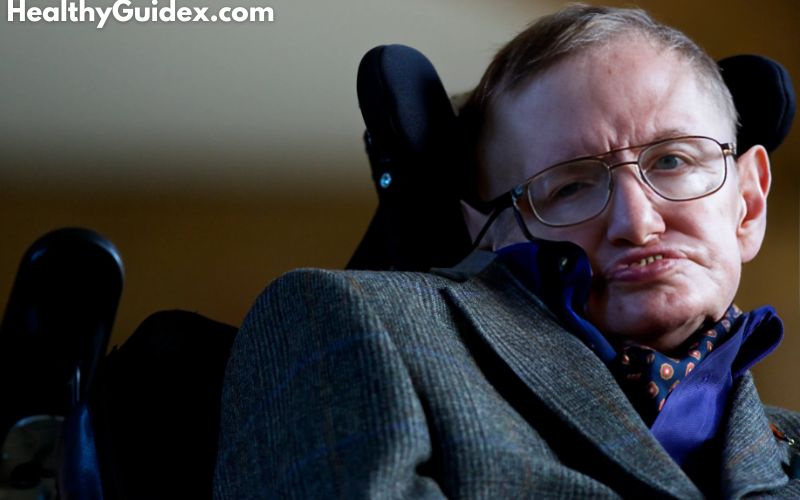Stephen Hawking, one of the most brilliant minds in the history of science, was renowned for his groundbreaking contributions to theoretical physics and cosmology. Despite living with a debilitating disease that confined him to a wheelchair and significantly limited his physical abilities, Hawking continued to inspire the world with his intellect and perseverance. The disease that shaped his physical existence was Amyotrophic Lateral Sclerosis (ALS), also known as Lou Gehrig’s disease in the United States.
This article explores Stephen Hawking’s life with ALS, detailing the disease, its symptoms, diagnosis, treatment, and how it impacted his life and work. By understanding the nature of ALS and Hawking’s extraordinary journey, we gain insight into the resilience of the human spirit and the enduring impact of his scientific legacy.
What is ALS?
ALS, or Amyotrophic Lateral Sclerosis, is a neurodegenerative disease that affects the nerve cells in the brain and spinal cord. It is part of a broader group of disorders known as motor neuron diseases (MND). In ALS, the motor neurons responsible for controlling voluntary muscle movements progressively degenerate and die. As a result, patients lose the ability to control their muscles, leading to paralysis and, ultimately, death.
ALS is named after its characteristics:
- Amyotrophic refers to muscle wasting or atrophy, which occurs due to the lack of nerve signals reaching the muscles.
- Lateral refers to the areas of the spinal cord that are affected by the disease.
- Sclerosis means hardening or scarring of the affected neurons.
ALS is a progressive disease, meaning that symptoms worsen over time, and there is currently no cure. The exact cause of ALS remains unknown in the majority of cases, though genetics and environmental factors are thought to play a role.
Symptoms of ALS
The early symptoms of ALS can vary widely from person to person, but they typically include:
- Muscle weakness, particularly in the arms, legs, and hands.
- Difficulty speaking or swallowing (dysphagia).
- Muscle cramps and twitching (fasciculations).
- Difficulty with fine motor tasks, such as buttoning a shirt or writing.
- Unsteadiness when walking, leading to frequent falls.
As the disease progresses, the symptoms become more severe and spread to other parts of the body. Eventually, individuals with ALS lose the ability to move, speak, eat, and even breathe without assistance. Despite the extensive physical decline, ALS typically does not affect cognitive abilities, leaving the person mentally aware of their condition.
The Prognosis for ALS Patients
The prognosis for ALS is generally poor. Most people diagnosed with the disease have a life expectancy of 3 to 5 years after the onset of symptoms. However, there are rare cases where individuals live significantly longer, as was the case with Stephen Hawking.
Stephen Hawking’s Diagnosis of ALS

Stephen Hawking was diagnosed with ALS in 1963 at the age of 21 while he was a student at the University of Cambridge. At the time of his diagnosis, Hawking was given just two years to live, a prognosis that would have limited his career and life achievements. However, against all odds, Hawking lived for more than five decades after his diagnosis, making him one of the longest-known survivors of ALS.
The fact that Hawking survived for so long with ALS is exceptional. Medical experts have speculated that Hawking may have had a rare, slower-progressing form of ALS. The exact reasons for his prolonged survival remain unknown, but it is a testament to the unpredictable nature of the disease.
Early Symptoms and Impact on Hawking’s Life
Before his diagnosis, Hawking noticed clumsiness and weakness, especially when performing physical activities. He had difficulty walking and would occasionally trip and fall. Over time, his speech became slurred, and he struggled with basic tasks that required manual dexterity.
Hawking’s diagnosis initially caused him great distress. He became depressed and wondered if continuing his work was even worthwhile given the grim prognosis. However, after a period of reflection and support from his family, he resolved to continue pursuing his academic goals. This decision led to his groundbreaking work in cosmology and theoretical physics, including his discovery of Hawking radiation and his contributions to our understanding of black holes.
How ALS Affected Hawking’s Physical Abilities
As the disease progressed, Hawking gradually lost the ability to move his arms and legs. By the late 1960s, he required the use of a wheelchair. Despite his worsening condition, Hawking’s mind remained sharp, and he continued his research and teaching at Cambridge University.
One of the most notable aspects of Hawking’s life with ALS was his use of a computerized voice synthesizer, which became his trademark. By the 1980s, he had lost almost all ability to speak. To communicate, he used a cheek muscle to control a switch that allowed him to select words from a screen. Although the voice was robotic and lacked intonation, it allowed him to continue sharing his ideas with the world.
Hawking’s Continued Contributions to Science
Even as ALS ravaged his body, Hawking’s intellect and passion for science remained undiminished. His work on black holes, quantum mechanics, and the origins of the universe earned him international acclaim. Hawking’s theory of Hawking radiation, proposed in 1974, was a groundbreaking discovery in theoretical physics, suggesting that black holes are not entirely black but emit radiation, leading them to eventually evaporate.
In addition to his academic work, Hawking became a celebrated author and popularizer of science. His book, A Brief History of Time (1988), became a global bestseller and brought complex scientific concepts to a general audience. Despite his physical limitations, Hawking’s ability to explain profound ideas in an accessible manner made him a beloved figure in both the scientific community and popular culture.
The Psychological and Emotional Impact of ALS on Hawking
Living with ALS undoubtedly had a profound psychological and emotional impact on Stephen Hawking. At the time of his diagnosis, ALS was virtually a death sentence, and the expectation that he had only a few years to live was devastating. Hawking struggled with depression, especially in the early years of his diagnosis, as he adjusted to the idea of living with a progressive and incurable illness.
However, Hawking’s resilience and determination allowed him to overcome these emotional challenges. With the support of his family and colleagues, he found a renewed sense of purpose. In later interviews, Hawking often emphasized that having a terminal illness gave him a unique perspective on life. He focused on what he could achieve rather than dwelling on his physical limitations. This mental fortitude was a crucial aspect of his success, both personally and professionally.
Treatment and Care for ALS Patients
There is no cure for ALS, and treatment focuses on managing symptoms and improving the quality of life for patients. The care for someone with ALS typically involves a multidisciplinary team, including neurologists, physical therapists, occupational therapists, speech therapists, and caregivers.
Some of the key treatments and interventions for ALS include:
- Medications: Drugs like Riluzole and Edaravone may slow the progression of ALS in some patients, though the effects are modest. Medications are also used to manage symptoms like muscle cramps, spasticity, and excessive saliva production.
- Physical Therapy: Stretching, exercise, and physical therapy can help maintain mobility and prevent muscle stiffness.
- Speech Therapy: Speech therapists help patients adapt to speech difficulties and, in some cases, assist with communication devices.
- Nutritional Support: As ALS progresses, many patients experience difficulty swallowing. In these cases, a feeding tube may be necessary to maintain adequate nutrition.
- Respiratory Support: ALS eventually affects the muscles responsible for breathing, so many patients require ventilatory support.
Hawking’s Legacy and Impact on ALS Awareness
Hawking’s high-profile battle with ALS helped raise awareness about the disease and inspired others facing similar challenges. His ability to live a full and productive life despite his severe physical limitations brought attention to the need for research into ALS and other neurodegenerative diseases.
Hawking’s life is a testament to the power of the human spirit to triumph over adversity. His intellectual achievements and personal perseverance serve as an enduring inspiration to people worldwide, especially those living with chronic illnesses or disabilities. His legacy continues not only through his scientific work but also in the hope and determination he instilled in others facing difficult circumstances.
See Also: What Disease Did Michael Jackson Have?
FAQs
What disease did Stephen Hawking have?
Stephen Hawking was diagnosed with Amyotrophic Lateral Sclerosis (ALS), also known as Lou Gehrig’s disease. ALS is a progressive neurodegenerative disease that affects motor neurons, leading to muscle weakness and paralysis.
When was Stephen Hawking diagnosed with ALS?
Stephen Hawking was diagnosed with ALS in 1963 at the age of 21, while he was a student at the University of Cambridge.
How long did Stephen Hawking live after being diagnosed with ALS?
Despite being given a prognosis of only two years to live after his diagnosis, Stephen Hawking lived for more than five decades with ALS, passing away in 2018 at the age of 76.
How did ALS affect Stephen Hawking’s physical abilities?
As ALS progressed, Stephen Hawking gradually lost control of his muscles, eventually becoming fully paralyzed. He lost the ability to walk, move his arms and legs, and speak without assistance. However, his cognitive abilities were not affected by the disease.
How did Stephen Hawking communicate after losing the ability to speak?
After losing his ability to speak, Hawking used a computerized speech synthesizer that was controlled by a small muscle in his cheek. This allowed him to communicate by selecting words and phrases from a screen, which were then spoken aloud by the synthesizer.
Did ALS affect Stephen Hawking’s cognitive abilities?
No, ALS primarily affects motor neurons and does not usually impair cognitive functions. Stephen Hawking’s intellectual abilities remained intact throughout his life, allowing him to continue his work in theoretical physics and cosmology.
Is there a cure for ALS?
There is currently no cure for ALS. Treatment focuses on managing symptoms, slowing disease progression in some cases, and improving the quality of life for those affected by the disease.
How is ALS treated?
Treatment for ALS includes medications like Riluzole and Edaravone, physical therapy to maintain mobility, speech therapy to aid in communication, nutritional support through feeding tubes, and respiratory support for breathing difficulties.
What were some of Stephen Hawking’s major contributions to science despite having ALS?
Stephen Hawking made significant contributions to theoretical physics, particularly in the fields of black holes and cosmology. His theory of Hawking radiation, proposed in 1974, showed that black holes emit radiation and can eventually evaporate. He also authored the popular science book A Brief History of Time.
Why did Stephen Hawking survive so much longer than most ALS patients?
The reason for Stephen Hawking’s exceptionally long survival with ALS is not fully understood. Medical experts believe he may have had a rare, slow-progressing form of the disease, but the exact cause of his extended lifespan remains unknown.
Conclusion
Stephen Hawking’s life with ALS is a remarkable story of triumph over adversity. Despite being diagnosed with a terminal illness at a young age, Hawking defied the odds and lived for over 50 years with ALS, during which he made some of the most significant contributions to our understanding of the universe. His resilience, determination, and genius left an indelible mark on science and the world at large.
ALS is a devastating disease, but Hawking’s life demonstrates that even in the face of great physical challenges, the human mind can continue to thrive and achieve greatness. His life is a symbol of hope for individuals living with ALS and other disabling conditions, showing that with the right mindset, it is possible to overcome the obstacles life presents and leave a lasting legacy.




